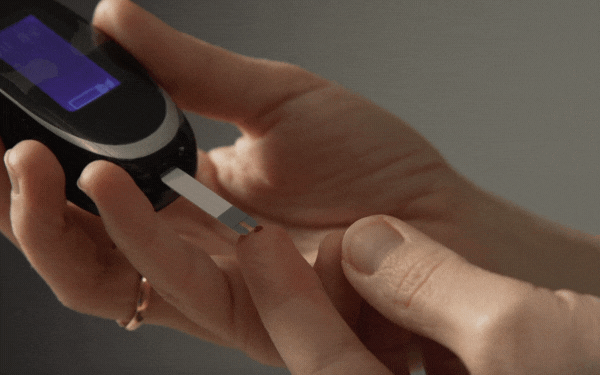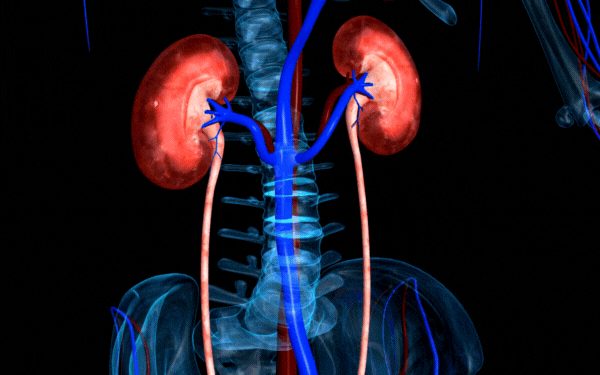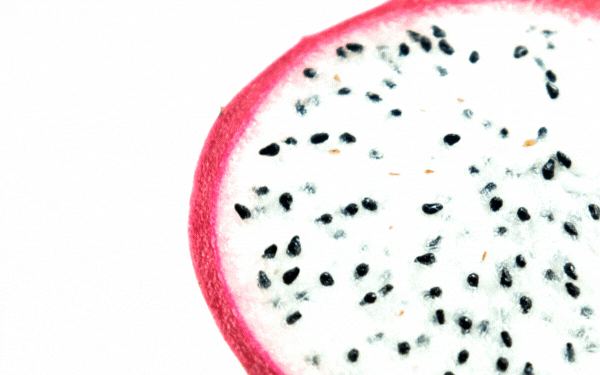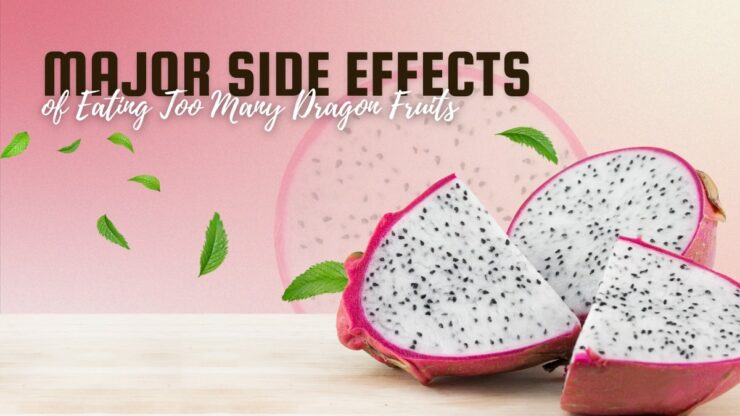Dragon fruit, also known as pitaya, is a popular exotic fruit that has become increasingly popular due to its sweet and refreshing taste, as well as its many health benefits. However, like all good things, consuming too much of this delicious fruit can have some major side effects that can negatively impact your health.
In this article, we will explore some of the side effects of eating too many dragon fruits and provide some tips on how to consume this fruit in moderation.
Side Effects of Excessive Fiber Consumption

Consuming too much dietary fiber can have some unexpected side effects on your health. They are rich in dietary fiber, so those who consume too many dragon fruits might experience some unwanted health issues.
Let’s look at the major side effects that result from consuming too much dietary fiber through eating dragon fruits.
Diarrhea
While it is a great source of fiber, consuming too much of it can lead to diarrhea, a common side effect of excessive fiber consumption.
The high fiber content in dragon fruit can increase bowel movements, which can potentially lead to loose stools and diarrhea, particularly if you eat too much of it in one sitting.
Other potential side effects of excessive fiber consumption from it or other fiber-rich foods include bloating, gas, abdominal cramps, and constipation in some cases.
The key is to consume it in moderation, drink plenty of water with your meals, and gradually increase your fiber intake over time to avoid digestive discomfort.
Abdominal Bloating

Abdominal bloating is a common side effect of excessive fiber consumption, including the consumption of dragon fruits. Despite being a healthy source of fiber, they can lead to bloating when consumed in excess.
Here are some major side effects of eating too many dragon fruits:
- Abdominal discomfort: Eating too many of them can cause abdominal discomfort, including bloating, gas, and cramps.
- Diarrhea: Excessive consumption can lead to diarrhea. This is because they are a natural laxative due to their high fiber content.
- Blood sugar fluctuations: They are rich in natural sugars that can cause a spike in blood sugar levels. This can be harmful to individuals with diabetes or insulin resistance.
To avoid these side effects, practice moderation when consuming dragon fruits or any high-fiber foods. It is also important to drink plenty of water throughout the day to aid in digestion and prevent bloating.
Constipation
Constipation can occur due to excessive consumption of fiber, which can be a side effect of incorporating too many dragon fruits into your diet.
The major side effects of eating too many of them are:
Diarrhea – Excessive fiber intake can lead to diarrhea or loose stools.
Abdominal discomfort – High fiber intake can cause abdominal discomfort, bloating, or nausea.
Dehydration – Fiber requires water to pass through your system, and if you consume too much of it without adequate water intake, it may cause dehydration.
Allergic reactions – Some people might develop an allergy to them, which may lead to hives, itching, or difficulty breathing. If you experience any of these symptoms, stop consuming them.
If you experience any discomfort or symptoms, talk to a healthcare provider.
Allergic Reactions

They are a popular tropical fruit with a unique appearance, sweet taste, and health benefits. However, consuming too many can lead to some serious side effects, including allergic reactions.
Let’s take a look at how they can cause allergic reactions, what kind of symptoms can be expected, and how to treat them.
Anaphylaxis
Anaphylaxis is a severe allergic reaction that can be triggered by consuming dragon fruits. It is one of the major side effects of overindulging in this fruit.
Symptoms of anaphylaxis may include hives, itching, swelling, trouble breathing, and low blood pressure. In severe cases, it can be life-threatening and require urgent medical attention.
If you experience any of these symptoms after eating dragon fruit, seek medical help immediately.
Skin Rash
Consuming too many of them can lead to skin rashes and allergic reactions due to their high histamine content.
Here are some of the major side effects of eating too many dragon fruits:
Skin rash: The high histamine content in them can cause skin rashes or hives in some people. These rashes may appear as red or pink blotches on the skin and can be itchy or painful.
Allergic reactions: Consuming too many dragon fruits can also trigger an allergic reaction in some people. Allergic reactions can be mild or severe and may include symptoms such as hives, swelling of the lips, tongue, or throat, difficulty breathing, nausea, and vomiting.
If you experience any of these side effects after eating dragon fruits, seek medical attention immediately.
Swelling of Lips and Tongue
Swelling of lips and tongue is a common symptom of an allergic reaction, which can be a major side effect of eating too many dragon fruits. Allergic reactions to them are not uncommon and can vary in severity from person to person, ranging from mild irritation to life-threatening anaphylaxis.
If you experience swelling of your lips and tongue after consuming dragon fruits, seek medical help immediately. Other symptoms of an allergy may include hives, itching, abdominal cramps, and vomiting.
To avoid an allergic reaction, start by introducing a small amount of dragon fruit into your diet and observe any reactions before consuming larger amounts. If you are prone to allergies, ask your doctor before adding it to your diet.
Effects on Blood Glucose

It can have a negative effect on your blood glucose levels. High fructose content in dragon fruits can make your blood glucose levels spike, which can cause a number of health problems in the long run.
In this section, we’ll discuss in detail the effects of eating too many dragon fruits on your blood glucose levels.
Blood sugar spikes
Dragon fruit is a low glycemic index fruit, and consuming it in moderate amounts is generally safe. However, consuming too much of it can lead to blood sugar spikes.
The high fiber and fructose content in dragon fruit can cause a spike in blood sugar levels if consumed in excess. Such spikes can be harmful to persons with diabetes, pre-diabetes, or insulin resistance. Symptoms include increased thirst, frequent urination, and fatigue.
To avoid blood sugar spikes, it’s important to monitor your dragon fruit intake and consume it in moderation. Eating it with foods high in protein and healthy fats can also help regulate blood sugar levels. Moreover, it is always best to consult a healthcare professional before adding any new fruit to your diet plan.
Interaction with diabetes medications
Eating too many dragon fruits can cause a spike in blood glucose levels and interact with diabetes medications.
It’s high fiber and low glycemic index can help regulate blood glucose levels in people with diabetes. But, overconsumption of this fruit can lead to a sudden increase in blood sugar levels due to its high fructose content.
Additionally, it can interact with diabetes medications, especially those that stimulate the production of insulin, resulting in hypoglycemic episodes.
Therefore, people with diabetes should consume it in moderation, and it is advisable to consult a doctor before including this fruit in the diet or changing any medications.
Hypoglycemia risk
Hypoglycemia risk is a major concern for those who consume too many dragon fruits due to their effect on blood glucose levels.
They are a good source of fiber and are low in sugar, but they do contain significant amounts of fructose and glucose, which can cause a spike in blood sugar levels if consumed excessively.
This spike can then lead to a sudden drop in blood sugar levels, causing hypoglycemia. Symptoms of hypoglycemia include dizziness, confusion, and fatigue.
It is important to remember that moderation is key when consuming dragon fruits, especially for those with diabetes or hypoglycemia.
Effects on Kidney Health

Due to their high sugar content and oxalates, they could cause kidney stones in people who are sensitive to these substances. Additionally, excessive consumption of dragon fruits can lead to an increase in uric acid levels in the body which could put additional strain on your kidneys.
Let’s explore these risks in further detail.
Kidney stone formation
While eating dragon fruit has many health benefits, consuming too much of this exotic fruit can lead to the formation of kidney stones.
Dragon fruit is known to be high in oxalates, natural compounds found in many foods that can bind with calcium in the urine, leading to the formation of kidney stones. Additionally, excessive consumption of dragon fruit can cause diarrhea and stomach cramps due to its high fiber content.
To prevent these side effects, it’s crucial to limit your intake of dragon fruit and consume it in moderation. If you have a history of kidney health issues or are prone to kidney stones, it’s best to consult with your healthcare provider before adding dragon fruit to your diet.
Risk for kidney disease
Here are some major side effects of consuming too many dragon fruits:
Oxalate Buildup: They are high in oxalates, which can accumulate in the body and lead to kidney stones if consumed in excess.
Heavy Metal Toxicity: They have been found to have a high concentration of heavy metals like cadmium, which can be toxic to the kidneys if consumed excessively.
High Sugar Content: They are also high in natural sugars, which can put a strain on the kidneys, especially in people with diabetes or kidney disease.
While eating dragon fruit in moderation can be beneficial, it is important to consume it in moderation and to be aware of its potential negative effects on kidney health.
High potassium levels
Consuming an excessive amount of this fruit can lead to high potassium levels in the body, which may have negative effects on kidney health.
High potassium levels can cause muscle weakness or paralysis, irregular heartbeat, and low blood pressure.
If you have kidney problems, it is important to limit your intake of high-potassium foods, including dragon fruit, as your kidneys may not be able to remove excess potassium from your body efficiently.
Interference with Certain Medications

They contain oxalic acid, which can interfere with the absorption of certain medications and can lead to a number of side effects.
Let’s take a closer look at the potential interference between dragon fruits and prescription medications.
Interaction with blood thinners and antiplatelet medications
Dragon fruits contain high amounts of certain chemicals that can interfere with blood thinners and antiplatelet medications. These chemicals reduce the blood’s ability to clot, which can increase the risk of bleeding when taken with these medications. Therefore, individuals who take blood thinners or antiplatelet medications, such as warfarin or aspirin, should avoid consuming large amounts of dragon fruit.
However, it’s essential to maintain an overall balanced diet as the nutrient content in dragon fruit helps in protecting the body from numerous diseases. Therefore, it’s recommended to consume dragon fruit in moderation or consult a doctor before including it in their diet.
Interaction with statins
It can interfere with certain medications, especially statins, which are used to lower cholesterol levels.
Statins work by reducing the amount of cholesterol in the liver, and dragon fruit can inhibit this process, leading to increased side effects such as muscle pain, weakness, and liver damage.
If you are taking statins or any other medication, it’s important to consult your doctor before adding dragon fruit to your diet.
Additionally, overconsumption of dragon fruits can lead to digestive problems such as bloating and diarrhea, due to their high fiber content. It can also lead to spikes in blood sugar levels in people with diabetes.
As with any other food, moderation is key when it comes to dragon fruit.
Interference with some types of antibiotics
Consuming dragon fruit might interfere with certain types of antibiotics and cause major side effects. This is because dragon fruit contains compounds that can impair the liver’s ability to metabolize certain medications, leading to increased levels of the drugs in the bloodstream.
For instance, if you’re taking antibiotics like erythromycin, it’s unwise to consume dragon fruit as it can reduce your liver’s ability to metabolize the drug properly, increase its concentration in the blood, and cause severe side effects like nausea, vomiting, diarrhea, abdominal pain, and liver toxicity.
If you’re on medication, always consult your doctor before adding any new food to your diet, especially if you have a pre-existing medical condition, as some foods can interact with drugs and cause unwanted side effects.
If you found this text useful, read our text about the major side effects of Acai berries and acai berries supplements.
FAQs

Can dragon fruits cause a drop in blood sugar levels?
Yes, they have a low glycemic index, which means they can cause a drop in blood sugar levels, particularly in individuals with diabetes.
Can dragon fruits cause digestive issues in individuals with IBS?
Yes, consuming excessive amounts can cause digestive issues in individuals with IBS.
Can dragon fruits cause tooth decay?
Yes, due to their high sugar content, consuming too many of them can cause tooth decay.
Can dragon fruits cause an upset stomach in individuals with a sensitive digestive system?
Yes, individuals with a sensitive digestive system may experience an upset stomach after consuming excessive amounts of dragon fruits.
Can dragon fruits cause a drop in blood pressure?
Yes, consuming excessive amounts can cause a drop in blood pressure, particularly in individuals taking blood pressure medications.
Can dragon fruits interact with caffeine?
There are no known interactions between dragon fruits and caffeine.
Can overconsumption of dragon fruits lead to vitamin and mineral deficiencies?
No, they are rich in vitamins and minerals, but excessive consumption can lead to imbalances in electrolytes, particularly potassium.
Conclusion
While dragon fruit is undoubtedly a healthy and delicious fruit that can provide many benefits to your health, it is important to consume it in moderation. Eating too much dragon fruit can have some major side effects that can negatively impact your health. By following our tips and consuming this fruit in moderation, you can enjoy its many benefits without experiencing any adverse effects. Remember, as with all things, moderation is key.

